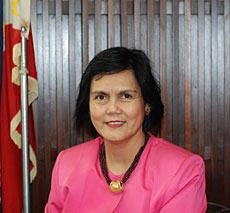BRASILIA: Philippine President Gloria Macapagal Arroyo arrives in Brazil today seeking Brazilian know-how in biofuels and its social welfare program called Bolsa Familia.
“This is the first ever visit of a sitting Philippine president to Brazil,” said Philippine Ambassador to Brazil Teresita V. G. Barsana in an interview. “Brazil is a major power in the world today, and the Philippines feels it is important to improve ties.
Several significant cooperation agreements will be signed between the two countries during Arroyo’s visit, including education, agriculture and biofuels.
President Arroyo is arriving in Recife, Pernambuco, in the northeast of the country where she will be inaugurating the new storage dock area of the terminal container port of Suape, which is being managed by the Philippine-owned International Container Terminal Services Inc. (ICTSI).
ICTSI won a contract in 2001 to manage the port of Suape for the next 30 years, and has already invested $10 million in the expansion of the dock area. It plans to spend $75 million by 2011 in improving the port, according to a report in the Brazilian newspaper Diario de Pernambuco.
On Tuesday, Arroyo will meet with Brazilian President Luis Inacio “Lula” da Silva in Brasilia, and will be briefed about Brazil’s ethanol program, which has been running since the 1970s, and about Lula’s Bolsa Familia program which has helped lift 12 million Brazilians out of poverty over the last five years.
“We recently started a similar poverty reduction scheme in the Philippines called Pantawid Pamilyang Pilipino Program, but on a much smaller scale than the Bolsa Familia program since we have less resources,” explained Barsana.
The Department of Social Welfare and Development administers the Philippine conditional cash-transfer program with additional input from the World Bank, which is providing some of the funding. So far, 379,345 of the poorest households in the Philippines have been enrolled in the program, with a total of 699,016 families expected to be enrolled by the end of this year.
Each enrolled household gets P500 ($12) a month for health and nutrition expenses, and an additional P300 ($7) a month per child (up to a limit of three children per household) for educational expenses. In return, enrolled families must pledge to keep their children in school for a minimum of 85 percent of the time, and mothers must attend childcare seminars.
“Five hundred pesos a month may seem like nothing to Westerners, but in the Philippines you can still buy things for P5 and P10, which is less than a dollar,” said Ambassador Barsana. “Our program is really to help the poorest of the poor.”
While Lula’s Bolsa Familia has been successful in lifting millions of Brazilians out of abject poverty, some critics of the cash-handout program say that some poorer Brazilians have stopped working altogether because they feel that the government handouts are enough for them to get by on.
Barsana said that the Philippines is keenly aware of this and does not want to create a culture of welfare dependency.
“It’s always better to teach someone how to bake a loaf of bread, rather than handing him a loaf,” she said.
Bilateral trade between Brazil and the Philippines stood at around $1 billion in 2008, with a slight advantage to Brazil of $90 million a year, according to the Philippine ambassador.
“Brazil’s main exports to the Philippines are tobacco leaf, iron ore and beef,” said Barsana, “while the main Philippine exports to Brazil are electronics, integrated circuit boards and fertilizer.”
President Arroyo will be having a private meeting with around 40 Filipinos living in Brazil while she is in Brasilia. She will visit Rio de Janeiro on the last leg of her trip.
There are only approximately 400 Filipinos living in Brazil, according to Barsana, who said most of them were missionaries.
This is not Arroyo’s first visit to Brazil. She visited in 1966 with her late father and former president Diosdado Macapagal, who had previously visited Brazil for the inauguration of the new capital city of Brasilia in April 1960 when he was the vice president.


